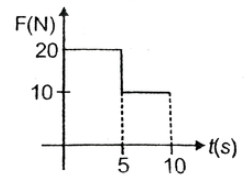An object of mass 3kg is at rest. Now a force of →F=6t2ˆI+4tˆj is applied on the object, the velocity of object at t=3s is.
18ˆi+3ˆj
18ˆi+6ˆj
3ˆi+18ˆj
18ˆi+4ˆj
The correct Answer is:B
Step by step video, text & image solution for An object of mass 3 kg is at rest. Now a force of vec F = 6 t^2 hat I + 4 t hat j is applied on the object, the velocity of object at t= 3 s is. by Physics experts to help you in doubts & scoring excellent marks in Class 12 exams.
Updated on:21/07/2023Topper's Solved these Questions
- NEWTON'S LAWS OF MOTION & FRICTION BOOK - MOTIONCHAPTER - NEWTON'S LAWS OF MOTION & FRICTION EXERCISE - Exercise - 2 SECTION-B :- Pulley Block System
7 Videos
- NEWTON'S LAWS OF MOTION & FRICTION BOOK - MOTIONCHAPTER - NEWTON'S LAWS OF MOTION & FRICTION EXERCISE - Exercise - 2 SECTION-C :- Pseudo force, Weighing Machine
2 Videos
- NEWTON'S LAWS OF MOTION & FRICTION BOOK - MOTIONCHAPTER - NEWTON'S LAWS OF MOTION & FRICTION EXERCISE - Exercise - 1 SECTION-F :- Direction of friction, Pulley Block system on horizontal plane, Pulley Block system on inclined plane, Two Block system, Two Block on Inclined plane
12 Videos
- MODERN PHYSICS -1BOOK - MOTIONCHAPTER - MODERN PHYSICS -1EXERCISE - EXERCISE-4 ( LEVEL- II)
39 Videos
- NLM & FRICTIONBOOK - MOTIONCHAPTER - NLM & FRICTIONEXERCISE - EXERCISE-4 ( LEVEL-II)
15 Videos
Similar Questions
A body of mass 1kg is acted upon by a force →F=2sin3πˆi+3cos3πˆj.Find its position at t=1sec if at t=0 it is at rest at origin.
View SolutionForce is applied on an object of mass 2 kg at rest on a frictionless horizontal surface as shown in the graph. The speed of object at t = 1s is will be F (N) 20 10 t(s) 10 5
View Solution
Knowledge Check
An object of mass 3 kg is at rest. Now a force F=6t2ˆj+2tˆj N is applied on the object. Find the velocity of the object at t=3 sec.
A18→i+3→jB18→i−3→jC3→i−18→jD3→i+18→jAn object of mass 2 kg at rest at origin starts moving under the action of a force
→F=(3t2ˆi+4tˆj)N The velocity of the object at t = 2 s will be -A(3ˆi+2ˆj)m/sB(2ˆi+4ˆj)m/sC(4ˆi+4ˆj)m/sD(3ˆi−4ˆj)m/sA body with mass 5 kg is acted upon by a force →F=(−3ˆi+4ˆj)N. If its initial velocity at t =0 is →v=6ˆi−12ˆjms−1, the time at which it will just have a velocity along the y-axis is :
AneverB10 sC2 sD15 s
Force is applied on an object of mass 2 kg at rest on a frictionless horizontal surface as shown in the graph. The speed of object at t=1 s will be

View Solution(a) At a certain instant, a particle-like object is acted on by a force →F=(4.0N)ˆi−(2.0N)ˆj+(9.0N)ˆk while the object's velocity is →v=−(2.0m/s)ˆi+(4.0m/s)ˆk. What is the instan-taneous rate at which the force does work on the object ? (b) At some other time, the velocity consists of only a y component. If the force is unchanged and the instantaneous power is -15 W, what is the velocity of the object ?
View SolutionA body of mass 1kg begins to move under the action of a time dependent force →F=(2tˆI+3t2ˆj)N, where ˆi and ˆj are unit vectors along x-and y-axes. What power will be developed by the force at the time t ?
View SolutionThe position of a particle is given by →r=3tˆi−4t2ˆj+5ˆk. Then the magnitude of the velocity of the particle at t = 2 s is
View SolutionA force →F=(3tˆi+5ˆj)N acts on a body due to which its position varies as →S=(2t2ˆi−5ˆj). Work done by this force in initial 2s is:
View Solution
